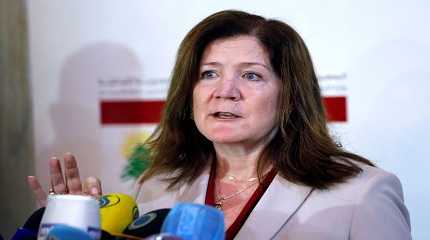
BEIRUT (AP) — The U.S. ambassador to Lebanon on Saturday delivered a maritime border demarcation proposal to President Michel Aoun, caretaker Prime Minister Najib Mikati and Speaker Nabih Berri on Saturday, as negotiations with Israel progress.
Lebanon and Israel have been officially at war since Israel’s creation in 1948 and both countries claim some 860 square kilometers (330 square miles) of the Mediterranean Sea.
Amos Hochstein, a senior adviser for energy security at the U.S. State Department who has been mediating between the two neighbors, last visited Beirut in September, where he expressed optimism after meeting with Lebanon’s president, caretaker prime minister and parliament speaker.
Aoun’s office in a statement said U.S. Ambassador Dorothy Shea delivered a proposal from Hochstein during a meeting at the presidential palace in Baabda.
Lebanon will assess the proposal before responding to Hochstein, though leaders have hinted they could soon reach a settlement.
Speaker Berri in an interview with London-based Asharq Al-Awsat newspaper Saturday said the proposal “in principle meets the Lebanese demands.”
President Aoun last week said in an interview with local media the negotiations could soon come to a close.
Lebanon and Israel both claim some 860 square kilometers (330 square miles) of the Mediterranean Sea. Lebanon hopes to unleash offshore oil and gas production as it grapples with the worst economic crisis in its modern history, plunging three-quarters of its population into poverty.
Israeli officials are also set to receive Hochstein’s proposal, though no official announcement has been made yet. Israeli Prime Minister Yair Lapid expressed “cautious optimism” on the matter in a press briefing last week.
A Lebanese official who attended the talks last month told The Associated Press that the proposal put forward by the U.S. envoy gives Lebanon the right to the Qana field, located partially in Israel’s domain. A part of it stretches deep into a disputed area. The official added that the main point now is how to draw the demarcation line in a way that stretches south of Qana.
Israel set up a gas rig at its designated location at the Karish field. Israel says the field is part of its U.N.-recognized exclusive economic zone, while Lebanon insists Karish is in a disputed area.
In July, the Israeli military shot down three unarmed drones belonging to Lebanon’s Iran-backed militant group Hezbollah flying over the Karish field. Hezbollah’s leader has issued warnings to Israel over the maritime dispute, saying that “any arm” that reaches out to steal Lebanon’s wealth “will be cut off.”
The heavily armed group, which has fought several wars with Israel, has repeatedly said in the past that it would use its weapons to protect Lebanon’s economic rights. Hezbollah officials have however said they would endorse a deal reached between Lebanon’s government and Israel.
Hezbollah leader Hassan Nasrallah in a speech Saturday echoed similar sentiments to Lebanon’s top political leaders about Hochstein’s proposal, and reasserted that the Iran-backed party will back Lebanon’s political leadership’s position. “God willing, if it reaches the desired and best result, it would be the result of national unity, cooperation, and solidarity,” he said.




